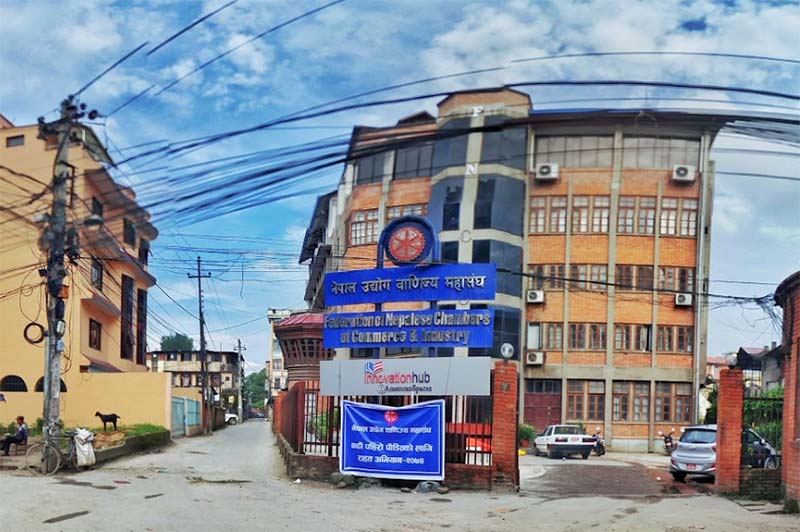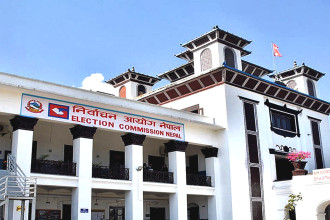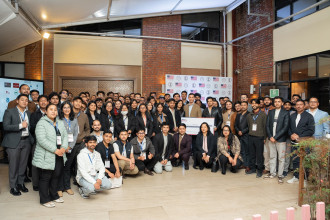
KATHMANDU: The budget for the fiscal year 2022/23 focuses on issues included in the 'National Economic Transformation 2030 Vision Paper' prepared by the Federation of Nepalese Chambers of Commerce and Industry (FNCCI).
Finance Minister Janardan Sharma presented the budget at the meeting of the Federal Parliament on May 29. The government has brought new budget of Rs 1,793.83 billion for the fiscal year 2022/23.
The vision paper includes various topics such as export promotion, import replacement and recovery in the aftermath of the Covid 19 pandemic.
With the inclusion of a separate heading on the promotion of private sector, the budget has given importance to the role of the private sector in the economy.
In a press statement issued today, FNCCI has said it is positive that the budget announced the national campaign year of agricultural production through which the import of basic agricultural products like paddy, maize, wheat, vegetables and fruits will be reduced by 30% in the coming fiscal year.
The federation has committed to cooperating with the government in the formulation and implementation of the action plan to achieve this goal. The provision of 100% tax exemption on the income earned by running agribusiness, vegetable dehydrating business and cold store business will help in the commercialisation of agriculture, FNCCI stated.
The budget states that exports will be doubled in the coming fiscal year, imports will be reduced by at least 20% and the trade balance will be maintained within the next five years. The goal of export promotion and import substitution can be achieved with the cooperation and encouragement of the private sector as the vision paper has already prepared an action plan to lower the ratio between gross domestic product (GDP) and trade deficit by half by 2030.
The federation will cooperate with the government in the implementation of the 'Made in Nepal' campaign that was launched by the federation about 15 years ago.
The budget has given continuity to the arrangement of providing startup capital in startup businesses to develop youth entrepreneurship and innovation. FNCCI has demanded quick implementation of this provision that is in the budget for the current fiscal year 2021/22. The issue of providing loans on the basis of projects has been welcomed by the private sector. For its implementation, the federation has already submitted a study report to the Ministry of Finance and Nepal Rastra Bank (NRB).
FNCCI has taken up the issue of providing soft loans through the establishment of 'Challenge Fund' to encourage businesses run by youth and returnees from foreign employment and operation of business incubation centres in all seven provinces to expand knowledge-based businesses in partnership with the private sector.
FNCCI has said it will assist in mobilising its provincial chapters and the entire structure to make the campaign of operating incubation centres successful.
For the promotion of small and medium enterprises (SMEs), the issue of establishing front and back interrelationships with large industries and the support of large and medium enterprises to startups has been welcomed. This will also help the '50 startup 50 investor programme' launched by the FNCCI.
Likewise, the herbal entrepreneurs are elated by the arrangement to set up herbal processing industry at the province level. The government could initiate the programme with the support of FNCCI which has prepared infrastructure in Surkhet.
It is necessary to ensure the operation of Bhairahawa and Simara Special Economic Zones by allocating budget necessary for their full operation. The private sector has sought assurance to complete the construction of Nepalgunj integrated check post (ICP) and start the construction of Bhairahawa ICP.
The Vision Paper includes 100 initiatives to expand the economy to $100 billion and to create more than 2.2 million jobs in the formal private sector by 2030. A blueprint for its implementation has been prepared and the work of implementing about 20 initiatives has already started. The policy of maintaining interest rate differential in the productive sector and commercial sector is positive, FNCCI viewed.
The cash subsidy of 8% on exports of high-quality domestic products such as clinker, cement, steel, footwear, processed water and IT-based services and business process outsourcing will further help in the promotion of domestic industries, the federation viewed and suggested making an arrangement to differentiate the custom rate on raw materials and finished goods and to implement it immediately.
The FNCCI has welcomed the announcement of providing government land in lease for the operation of industries.
The implementation of discounts on annual licence and renewal fees and concessional loan facilities for the revival of hotel, tourism, film (production, distribution, exhibition) industries could provide relief to a greater extent. Likewise, the federation has urged the government to make arrangements for offering discounts on electric tariffs for SMEs.
Likewise, the federation has said when a promoter builds a transmission line from the project site to the substation, the provision of providing reimbursement up to 75% of the cost is positive.
The federation has drawn the attention of the government towards excise duty and customs duty on electric vehicles that have been increased again although it was announced to offer discounts on electric stoves for import substitution.
The remittance inflow through formal channels is expected to increase with the opening of investment of non-resident Nepalis in the secondary market of securities, and the provision of 10% reservation in initial public offering (IPO) to the citizens who are in foreign employment. The provision of 50% discount on fees or charges for renewal of passport, consular service and renewal of work permit to Nepali citizens in foreign employment is positive, the federation stated.
The provision of 1% income tax on business outsourcing exports will help in the development of IT sector.
The discount facility given in the renewal of private firms will bring relief to the small entrepreneurs. The arrangements to make permanent account number (PAN) mandatory will help increase the tax range.
Likewise, achieving a massive budget size and economic growth of 8% will be challenging amid the liquidity and external pressures on the economy after the Covid 19 pandemic subsided, the FNCCI has stated.
"In the current economic scenario, the target of revenue growth seems unrealistic. This will put more pressure on the private sector," the statement read.
In order to achieve the budget target, it is necessary to reduce the business cost through the policy procedures and monetary policy that will come in the course of budget implementation by giving more encouragement to the private sector, especially SMEs, said the statement.
READ ALSO:
Published Date: June 1, 2022, 12:00 am
Post Comment
E-Magazine
RELATED B360 National





